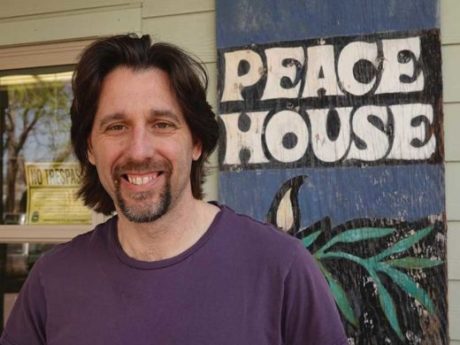‘Peace House Community Journal’ Archives
We’re Doing Our Best

from the series Peace House Community Journal By MARTI MALTBY It was about forty yards to the gallows. I watched the bare brown back of the prisoner marching in front of me. He walked clumsily with his bound arms, but quite steadily, with that bobbing gait of the Indian who never straightens his knees. At each step his muscles slid neatly into place, the lock of hair on his scalp danced up and down, his feet printed themselves on the wet gravel. And once, in spite of the men who gripped him by each shoulder, he stepped slightly aside to avoid a puddle on the path.-George Orwell, 'a hanging' Marti Maltby One of Orwell’s gifts as a writer, in my opinion, was his ability to see the humanity of others, even those who were supposed to be his enemies. In his 20s, Orwell served in the British Imperial Police in Burma, which meant he was part of the oppressive system that generated Britain’s wealth and maintained her empire. He hated it. Where his countrymen saw a dirty and [...]
A Hopeful Sign

from the series Peace House Community - A Place to Belong By MARTI MALTBY Marti Maltby Like many people in this part of Minneapolis, I am continually reminded of the challenges facing our neighborhoods. High crime rates, limited resources, livability, crimes, drug use… you know the list as well as I do. Aside from my personal observations, I hear about the challenges the members at Peace House Community deal with every day. I also attend meetings hosted by the Metro Urban Indian Directors (MUID), which works to combat the homelessness and opioid epidemics in the local Native American community. As you might expect, most of what I hear about conditions on the street and in the encampments is pretty depressing. I realized this week how cynical I have become because of these issues, but it was actually some good news that brought this to my attention. Dawn LaRoque of the Minnesota Indian Women’s Resource Center spoke of changes she has started seeing as a result of [...]
Something to Offer

from the series Peace House Community- A Place to Belong By MARTI MALTBY Marti Maltby Like many social service organizations, Peace House Community relies on volunteers to achieve its goals. Those who donate their time and, more importantly, their talents enrich the experience of our community when they come to our building. I am always thankful for our volunteers, and I knew we have added several services lately as new volunteers have joined us, but it wasn’t until a week or two ago that I grasped just how much goes on here because of volunteers. If I look only at what our volunteers do directly with the community members, the list reads: HaircutsHand massagesManicuresArt projectsWood carving classesWriters groupBlood pressure checksBicycle repairNeck and back massagesLive music during lunchMaintaining our gardenHave normal conversations with our members. This list doesn’t include the behind the scenes work of our volunteers, like sorting donations and maintaining [...]










